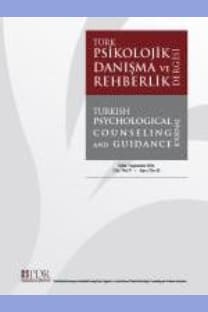Psikolojik Danışman Adaylarının Başarı Yönelimlerinin Bazı Değişkenlere Göre Yordanması
başarı yönelimi, kendilik algısı, öz-yeterlik, stresle başa çıkma
Predicting Candidate Psychological Counselors’ Goal Orientations As Related to Several Variables
goal orientation, self-perception, self-efficacy, coping with stress,
___
- Dweck, C.S. (1986). Motivational process affecting learning. American Psychologist, 41(10), 1040-1048.
- Dweck, C.S. & Leggett, E.L. (1988). A social-cognitive approach to motivation and personality. Psychological Review, 95(2), 256-273.
- Elias, S. M. & Loomis, R. J. (2000). Using an academic self- efficacy scale to address university major persistence. Journal of College Student Development, 41, 450-454.
- Elliot, A. J. (1997). Integrating the “classic” and “contemporary” approaches to achievement motivation: A hierarcial model of approach and avoidance achievement motivation. M.L. Maehr ve P.R. Pintrich (Eds.), Advances in motivation and achievement içinde (pp.143-179). Greenwich, CT: JAI Press.
- Elliot, A.J. (1999). Approach and avoidance motivation and achievement goals. Educational Psychologist, 34, 169-189.
- Elliot, A.J. & Church, M.A. (1997). A hierarchical model of approach and avoidance achievement motivation. Journal of Personality and Social Psychology, 72, 218-232.
- Elliot, A.J. & Covington, M.V. (2001). Approach and avoidance motivation. Educational Psychology Review, 13, 73-92.
- Elliot, A.J. & Harackiewicz, J.M. (1996). Approach and avoidance achievement goals and intrinsic motivation: A mediation analysis. Journal of Personality and Social Psychology, 70, 461-475.
- Elliot, A.J. & McGregor, H. (2001). A 2x2 achievement goal framework. Journal of Personality and Social Psychology, 80(3), 501-519.
- Ferrari, J.R. (1992). Procrastinators and perfect behavior: An explatory factor analysis of self-presentation, self- awareness, and self-handicapping 2, 21-34. components. Journal of Research in Personality, 26, 75-84.
- Finney, S.J. & Davis, S.L. (2003). Examining the invariance of the achievement goal questionnaire across gender. Paperpresented at the annual meeting of the American Educational Research Association, Chicago: USA.
- Gözüm, S. ve Aksayan, S. (1999). Öz-etkililik-yeterlik ölçeğinin Türkçe formunun güvenirlik ve geçerliliği. Atatürk Üniversitesi Hemşirelik Yüksek Okulu Dergisi, 2, 21-34.
- Jagacinski, C.M. & Strickland, O.J. (2000). Task and ego orientation the role of goal orientations in anticipated affective reactions to achievement outcomes. Learning and Individual Differences, 12, 189-208.
- Josephs, R.A., Bosson, J.K. & Jacobs, C.G. (2003). Self- esteem maintenance processes: Why low self-esteem may be resistant to change. Personality and Social Psychology Bulletin, 29(7), 920-933.
- Lane, J., Lane, A. & Kyprianou. A. (2004). Self-efficacy, self-esteem and their impact on academic performance. Social Behaviour and Personality, 32(3), 247-256.
- Lazarus, R. S. & Folkman, S. (1984). Stress, appraisal, and coping. New York: Springer.
- Lemyre, P., Roberts, G. C. & Ommundsen, Y. (2002). Achievement goal orientations, perceived ability, and sportspersonship in youth soccer. Journal of Applied Sport Psychology, 14, 120–136.
- Maehr, M.L. (1989). Thoughts about motivation. In C. Ames & R. Ames (Eds.), Research on motivation in education: Vol.3. Goals and cognitions (pp. 299-315). New York: AcademicPress.
- Meece, J.L., Blumenfield, P.C. & Hoyle, R.H. (1988). Students’ goal orientation and cognitive engagement in classroom activities. Journal of Educational Psychology, 80, 514-523.
- Meece, J.L. & Holt, K. (1993). A pattern analysis of students’ achievement goals. Journal of Educational Psychology, 85, 582-590.
- Middleton, M. & Midgley, C. (1997). Avoiding the demonstration of lack of ability. An under-explored aspect of goal theory. Journal of Educational Psychology, 89, 710-718.
- Newman, R.S. (1998). Student’s help seeking during problem solving: Influences of personal and achievement goals. Journal of Educational Psychology, 90, 644-658.
- Nicholls, J.G. (1989). The competitive ethos and democratic education. Cambridge, MA: Harvard University Press.
- Pajares, F. & Cheong, Y.F. (2003). Achievement goal orientations in writing: A developmental perspective. International Journal of Educational Research, 39, 437-455.
- Pintrich, P.R. (2000). An achievement goal theory perspective on issues in motivation terminology, theory, and research. Contemporary Educational Psychology, 25, 92-104.
- Pintrich, P.R. & Schunck, D.H. (1996). Motivation in education: Theory, research, and applications. Englewood Cliffs, NJ: Prentice Hall.
- Roeser, R., Midgley, C. &Urdan, T. (1996). Perceptions of the school psychological climate and early adolescents’ self-appraisals and academic engagement. Journal of Educational Psychology, 88, 408-422.
- Sherer, M., Maddux, J., Mercandante, B., Prentice-Dunn, S., Jacobs, B. & Rogers, R. (1982). The self efficacy scale: Construction and validation. Psychological Reports, 51, 663-671.
- Şahin, N.H. ve Şahin, N. (1997). Sosyal Karşılaştırma Ölçeği. I. Savaşır ve N.H. Şahin (Ed.). Bilişsel- davranışçı terapi değerlendirme: Sık kullanılan ölçekler içinde (ss. 110-113). Ankara: Türk Psikologlar Derneği Yayınları.
- Tan, J.A. & Hall, R.J. (2005). The effects of social desirability bias on applied measures of goal orientation. Personality and Individual Differences, 38, 1891-1902.
- Tanaka, A. & Ysmauchi, H. (2001). A model for achievement motives, goal orientations, intrinsic interest, and academic achievement. Psychological Reports, 88, 123−135.
- Turner, J. C., Thorpe, P. K. & Meyer, D.K. (1998). Students’ reports of motivation and negative affect: A theoretical and empirical analysis. Journal of Educational Psychology, 90, 758-771.
- Türküm, A.S. (2002). Stresle başa çıkma ölçeğinin geliştirilmesi: Geçerlik ve güvenirlik çalışması. Türk Psikolojik Danışma ve Rehberlik Dergisi, 2(18), 25-34.
- Urdan, T. (1997). Achievement goals and the orientation of friends toward school in early adolescence. Contemporary Educational Psychology, 22, 165-191.
- Weiner, B. (1990). History of motivational research in education. Journal of Educational Psychology, 82, 616-622.
- Turkish Psychological Counseling and Guidance Journal / 2013, 4 (39)
- ISSN: 1302-1370
- Başlangıç: 1990
- Yayıncı: -
Aile İçi Şiddete Maruz Kalan Kadınlarda Aile İçi Şiddetle Başa Çıkma Özyeterliği
Lise Son Sınıf Öğrencilerinin Sınav Kaygısını Yordayan Değişkenlerin İncelenmesi
Çözüm Odaklı Kısa Süreli Psikolojik Danışma: Okullardaki Etkililiği Üzerine Bir İnceleme
Aldatmaya yönelik niyet ölçeği'nin Türkçe uyarlaması: Geçerlik ve güvenirlik çalışmaları
Esin TEZER, Ezgi DEMİRTAŞ TOPLU
Okullarda PDR Uygulamaları Dersine İlişkin Öğrenci Görüşlerinin İncelenmesi
Aldatmaya Yönelik Niyet Ölçeği’nin Türkçe Uyarlaması: Geçerlik ve Güvenirlik Çalışmaları
Ezgi TOPLU-DEMİRTAŞ, Esin TEZER
Evlilik Doyumunu Yordayan İlişkisel ve Kişisel Değişkenler
Psikolojik Danışman Adaylarının Başarı Yönelimlerinin Bazı Değişkenlere Göre Yordanması
Hatice ODACI, Çiğdem ÇELİK, Özkan ÇİKRIKCİ
İlköğretim Öğrencilerinin İnternet Bağımlılığı ve Aile İnternet Tutumu
